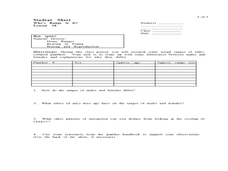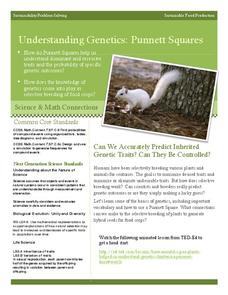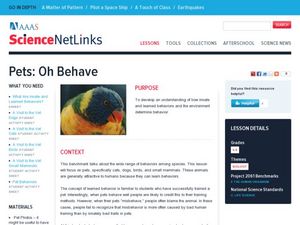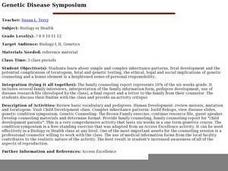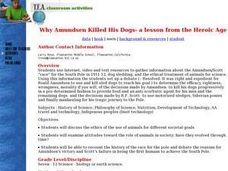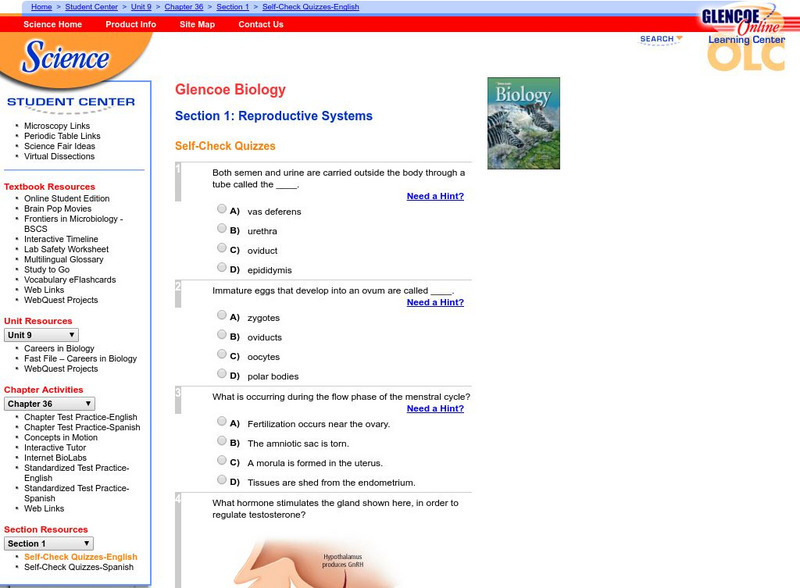Curated OER
Who's Range is it?
Students investigate the habits of panthers by analyzing radio transmitted data. In this animal life lesson, students utilize computers to view the range of different statistics dealing with Florida panthers. Students complete a...
Western Kentucky University
Understanding Genetics: Punnett Squares
Can scientists really predict genetic outcomes or are they simply making a lucky guess? Scholars first learn about Gregor Mendel and how to make Punnett squares. Then they extract DNA from a strawberry in a lab with included conclusion...
Serendip
The Ecology of Lyme Disease
Areas that previously included no risk of Lyme disease now have cases every year. Scholars learn about the spread of Lyme disease and the relationship with ecological succession. Then, they discuss possible solutions using the known food...
Curated OER
Turkeys in the Cell--The Meiosis Square Dance
Students identify synapsis as the key event in meiosis. They explain how synapsis leads to the formation of haploid gametes. Exploration of the differences between the processes of mitosis and meiosis occur. In accordance, explanations...
Curated OER
Pets: Oh Behave
Learners develop an understanding of how innate and learned behaviors and the environment determine behavior. They see how a variety of factors affects our pet's behavior-including species-specific traits, the environment, training, and...
Curated OER
The Skeletal System
Students identify bones off a skeleton during quizzes; assemble disarticulated skeletons; bird, frog and rat. They dissect frogs, remove the muscle tissue, and identify of bones.
Curated OER
How HIV Infects Cells
In this how HIV infects cells worksheet, students read the given information about how HIV infects cells. Students explain the role of various structures in HIV infection. Students design a drug that might slow the rate of cellular...
Curated OER
Sociobiology: Heredity Factors
Students examine DNA replication and how proteins are synthesized from DNA codes and continue to explore the effects of genetics in additional lessons. Among the topics covered are: protein synthesis, cell chemistry, environmental...
Curated OER
Can You Beat Jet Lag?
Students examine the health condition of jet lag. Using mealworms, they test the effect of light on the development of them into adults. They answer discussion questions and examine the relationship of age and one's activity level.
Curated OER
Pets: Oh Behave
Students develop an understanding of how innate and learned behaviors and the environment determine behavior.
Curated OER
Time Lapse Seed Germination with the QX3 Intel Digital Microscope
Students use the time-lapse feature of the QX3 Intel Digital Microscope
to observe germination of seeds. They use the QX3 Intel Digital microscope to create time lapse video films of seed germination experiments.
Curated OER
Genetic Disease Symposium
Students research simple and complex inheritance patterns, fetal development and the potential complications of teratogens, fetal and genetic testing, and the ethical, legal, and social implications of genetic counseling.
Curated OER
If It Smells Good, Is Edible, and Attracts Wildlife, Then It's a Practical Garden
Students explore landscape design. In this practical gardening lesson, students design landscape plans that call for shrubs, trees, and plants that can be used for aesthetics, cooking, and wildlife.
Curated OER
The Changing Coral Reef Community Game
Students examine organisms that inhabit the coral reefs and their living requirements. In this coral reef lesson students chart population changes and play a game.
Curated OER
White-tailed Deer: Beauty or Beast?
Students use study guides and videos to discuss the positive and negative impacts of white-tailed deer populations. In this wildlife management instructional activity, students view slides and discuss the natural history and value of...
Curated OER
Peeled Trees Tell The Story
Students investigate the diversity of life that is found in Montana. They research some of the different interactions that organisms have with their environment. The lesson includes an extensive introduction for teacher information....
Curated OER
Breaking News English: Laboratory-Created Eggs and Sperm
In this English learning exercise, students read "Laboratory-Created Eggs and Sperm," and then respond to 47 fill in the blank, 7 short answer, 20 matching, and 8 true or false questions about the selection.
Curated OER
Trail Adventure
Young scholars create a trail with numbered specimens. Students complete an accurate and functional interactive trail activity brochure. They complete a web page tree identification guide and interactive identification activity. Young...
Curated OER
Rollin' On The River II
Students explore the importance of the Platte River to the state of Nebraska. They investigate the river's historical, social, economic, and political importance to the development of Nebraska. Students explore the ecosystem of the river.
Curated OER
Why Amundsen Killed His Dogs
Students use Internet, video and text resources to gather information about the Amundsen/Scott race for the South Pole in 1911-12, dog sledding, and the ethical treatment of animals for science. They set up a debate to determine the...
McGraw Hill
Glencoe Biology: Reproductive Systems: Self Check Quiz
Answer these five multiple-choice questions about the human reproductive systems. After answers are submitted, students can review their mistakes.
CK-12 Foundation
Ck 12: Biology: Male Reproductive System Study Guide
Review the structure and function of the human male reproductive system.
University of Arizona
The Biology Project: Human Biology
This site provides basic information on human genetics and reproduction using tutorials, simulations, images and quizzes. There are also links to other worthwhile sites.
CK-12 Foundation
Ck 12: Life Science: Plant Reproduction and Life Cycle
[Free Registration/Login may be required to access all resource tools.] The life cycle of a plant is very different from the life cycle of an animal. Humans are made entirely of diploid cells (cells with two sets of chromosomes). Our...


